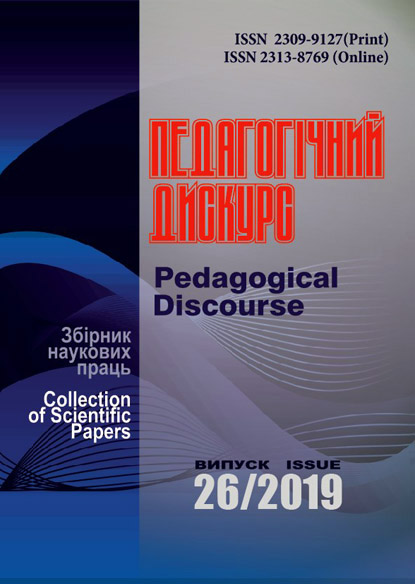Developing Future Teachers’ Digital Competence While Performing Learning and Research Project
Abstract
The experimental program is aimed at fulfilling the relevant targets of the future primary school teachers’ professional training, in particular forming and developing the digital competence. The author claims that the future teachers’ digital competence is formed as a result of integrating the cognitive, creative, communicative, and collaborative skills. The purpose of the scientific paper is studying the influence of the digital technology on the development of the future primary school teachers’ cognitive, creative, communicative, and collaborative skills while performing learning and research project.
In the study the author uses the methods of questionnaire, survey, and observation, as well as the methods of analyzing, comparing, and generalizing the obtained experimental results.
While studying the course «Basis of Scientific Research» during the term, the learning and research project «Student Scientific Conference» has been realized. The aim of the project is modelling the process of scientific findings, using the digital technologies for developing the future primary school teachers’ cognitive, creative, communicative, and collaborative skills. When implementing the project, the following forms of working with digital technologies and digital resources have been applied: working on the Internet, working with text editors, working with graphic editors and online services, mutual online cooperation, working with photo and video editors, working on the electronic social networking sites, and involving students from other higher educational institutions in participating in online learning.
The research results are presented in the form of comparative analysis of the indicators of the level of development of the future primary school teachers’ cognitive, creative, communicative, and collaborative skills, which are gained at the initial stage (the beginning of the 4th term in the academic year of 2015–2016) and the final stage of research (the end of the 4th term in the academic year of 2015–2016).
It is noted that the use of digital technologies at all the stages of the project results in increasing the development of cognitive, creative, communicative, and collaborative skills, which are essential for the future teachers’ professional activities in digital society.
The author proposes to introduce the course «Basis of Scientific Research» in the form of learning and scientific project, because such an approach contributes to enhancing the development of digital competence and encourages students to participate in scientific activities.
Downloads
References
Скрипка, Г. (2016). Формування в учнів навичок XXI століття засобами інформаційно-комунікаційних технологій. Інформаційні технології і засоби навчання, 4(54), 99–107. DOI: https://doi.org/10.33407/itlt.v54i4.1410. / Skrypka, H. (2016). Formuvannia v uchniv navychok XXI stolittia zasobamy informatsiino-komunikatsiinykh tekhnolohii [Developing Students Skills of the XXI Century by Means of ICT]. Informatsiini tekhnolohii s zasoby navchannia, 4(54), 99–107. DOI: https://doi.org/10.33407/itlt.v54i4.1410 [in Ukrainian].
Afari-Kumah, E., & Tanye, H. A. (2009). Tertiary students’ view on information and communications technology usage in Ghana. Journal of Information Technology Impact, 9(2), 81–90 [in English].
Allen, B., Caple, H., Coleman, K. & Nguyen, T. (2012). Creativity in Practice: Social Media in Higher Education. Proceedings of ASCILITE – Australian Society for Computers in Learning in Tertiary Education Annual Conference 2012. (pp. 15–20). Willington: Australasian Society for Computers in Learning in Tertiary Education [in English].
Building the Digital Competence Teacher Profile by Innovative Teaching Instruments (MoPED). (2018). Kyiv: Borys Grinchenko Kyiv University. URL: http://moped.kubg.edu.ua/wp-content/uploads/2014/03/MoPED_D1.4_DigComsummary.pdf [in Ukrainian].
Di Giacomo, D., Ranieri, J., & Lacasa, P. (2017). Digital Learning as Enhanced Learning Processing Cognitive Evidence for New Insight of Smart Learning. Frontiers in Psychology, 8. DOI: 10.3389/fpsyg.2017.01329 [in English].
Gasaymeh, Al-Mothana, M., Adnan, Moghrabi, Khaldun, & Al-Ghonmein, Ali Mohammad. (2017). University Students’ Perceptions of the Use of Digital Technologies in their Formal Learning: A Developing Country Perspective. International Journal of Learning and Development, 7, 149–164. DOI: 10.5296/ijld.v7i3.11666 [in English].
Lee, J.J. & Hsu, Y. (2002). Web navigation: The role of Metaphor, Concept Map and Individual Differences. In P. Barker & S. Rebelsky, (Eds.). Proceedings of ED-MEDIA, 2001 World Conference on Educational Multimedia, Hypermedia & Telecommunications (pp. 1000-1001). Norfolk, VA: Association for the Advancement of Computing in Education [in English].
Lewin, C. & McNicol, S. (2015). Supporting the Development of 21st Century Skills through ICT. In T. Brinda, N. Reynolds, R. Romeike, & A. Schwill (Eds.). KEYCIT 2014: Key competencies in informatics and ICT (pp. 98–181) [in English].
Morze N., Gladun M., Vember V., Buinytska O. (2018). Building the Digital Competence Teacher Profile by Innovative Teaching Instruments. Kyiv: Borys Grinchenko Kyiv University [in English].
Proposal for a Council Recommendation on Key Competences for Lifelong Learning. (2018). URL: https://ec.europa.eu/education/education-in-the-eu/council-recommendation-on-key-competences-for-lifelong-learning_en [in English].
Voogt, J., Erstad, O., Dede, C., & Mishra, P. (2013). Challenges to Learning and Schooling in the Digital Networked World of the 21st Century. Journal of Computer Assisted Learning, 29, 403–413 [in English].
Copyright (c) 2019 Pedagogical Discourse

This work is licensed under a Creative Commons Attribution-NonCommercial-ShareAlike 4.0 International License.

















